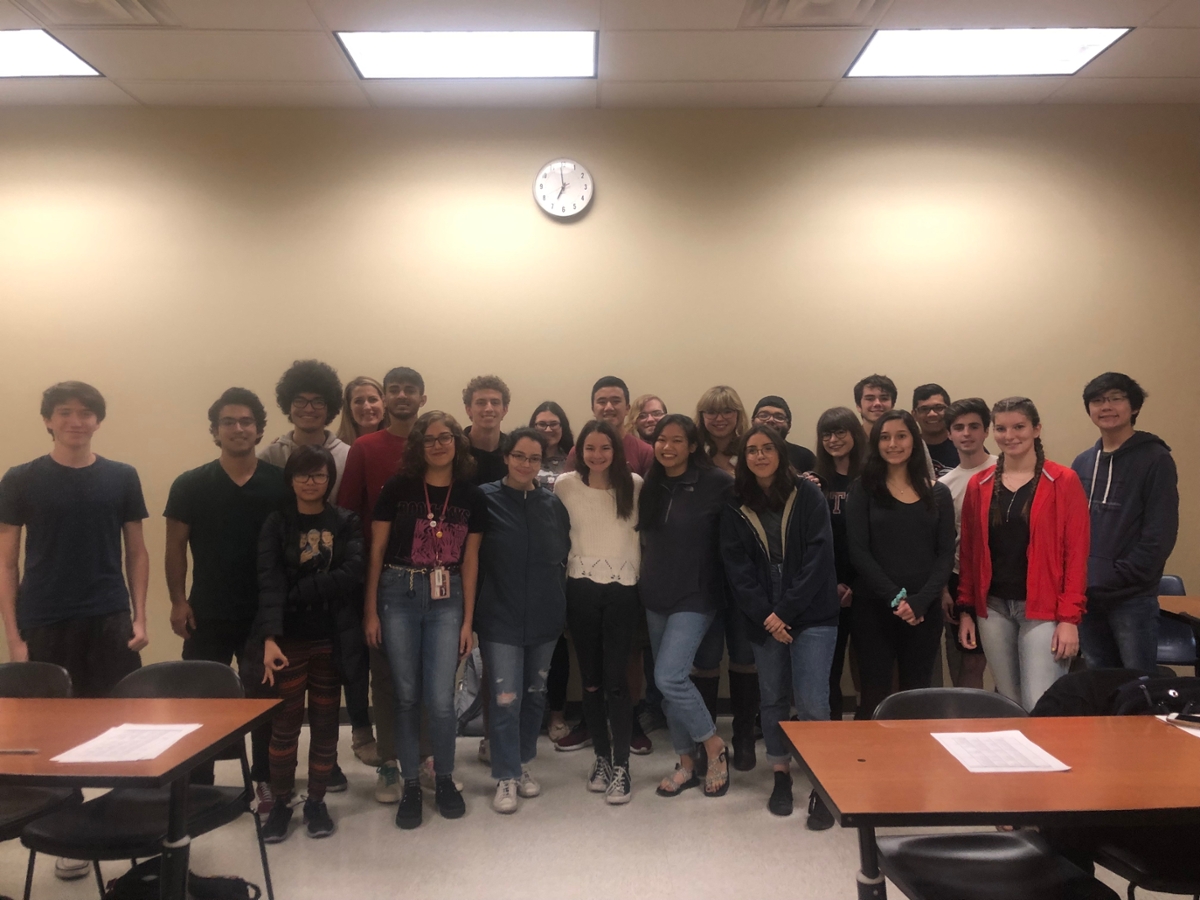Posted on April 12, 2021 by Rebeca Gomez

Amy Hauck's Storytelling class.
For Amy Hauck’s Storytelling across Media class, Honors College Freshmen worked together to create podcasts which focused the spotlight on UTSA. According to the syllabus, the mission of the course was to “explore the literary legacy of storytelling as a way to: actualize identity, preserve history, provide social testimony, cultivate empathy, encourage social responsibility, and generate knowledge through engaging and sharing narrative.” Students who took the course during one of the three times it was offered in the past, engaged in multifaceted ways by studying fiction, non-fiction, poetry, and multi-media. However, primary emphasis was given to oral history as they explored the power of narrative right here on the UTSA campus.
In groups of three to four students, they created podcasts for their final projects. Each podcast explores a different topic in-depth, through a storyteller’s lens. The students conducted interviews with experts from the UTSA community. The Honors College’s own Alegra Lozano (Endings) and John Phillip Santos (Creating), among others, have been featured on Storytelling across Media podcasts.
Student groups then transcribed all nine of their interviews, which must consist of three students, three faculty, and three professors emeriti/or someone who has been at UTSA over 20 years. Then they worked together to identify storylines, and build a script. Next, they chose a narrator, recorded the narration and edited the whole thing together to deliver a final product that was less than 15 minutes in length.
Although each podcast only covers one topic, the students strived to incorporate unique and unexpected perspectives on that topic. For example, the podcast entitled Stressing deals with personal stress, such as the stress students feel when they are overwhelmed, but it also deals with stress on buildings, the kind engineers must take into account when they are designing structures, and stress on economies.
Lecturer Hauck taught this course in the fall semesters of 2017, 2018 and 2019. With each new group, came a fresh crop of interests and perspectives to explore. The library of podcasts has grown to fourteen and it will continue to grow as Hauck continues to teach this course in the future.
Hauck collaborated with the Institute of Texan Cultures to acquaint students with best practices for recording, interviewing, and capturing oral histories. She also joined forces with local consultants from Texas Public Radio, as well as the Actors from the London Stage to help students develop their skillsets of voice acting and script building.
When designing the course, Hauck decided she wanted to incorporate podcasts so that students could “engage in storytelling in their everyday environments at UTSA through a medium they were not used to.” While the course design and project layout was entirely her own, Hauck said, she took inspiration on the final product from shows like This American Life, and The Stanford Storytelling Project.
Students left this class with all the skills they needed to create their own podcasts in the future, if they choose to do so. According to Hauck, “with apps like Anchor and software readily available, such as Garage Band, Audacity, and the like – it is relatively easy to begin producing your own content with a little bit of training and effort.”
In fact, two of Hauck’s former students, Mufaro Chitakure and Jesly Johnson, have plans to, maybe, do just that. Chitakure even purchased a microphone. He has been using it to hone his skills while he decides whether he wants to go public with a podcast of personal stories. Johnson, a cyber-security major, thinks that, in the future, she might create a podcast with a focus on cyber-security.
Regardless of whether either student ever creates a podcast, both agree that the benefits they gained from the course extend beyond just learning how to create podcasts. “In a more general sense, the class really helped me become more comfortable approaching professors as a freshman since we had to approach them for interviewing,” said Chitakure.
Johnson said that the course helped her prepare for her current job (as an honors peer coach) and her future career as a cyber-security expert. She explained that the “main task as peer coaches is to ask questions that will empower students to acknowledge their dreams or goals and provide them with the resources needed to fulfill them. As a result, framing questions in the proper way is crucial.” And question framing was a skill Johnson mastered during Hauck’s class. Johnson went on to say that, “Cybersecurity majors have a strong connection to stories. During the incident response process after an intrusion has been detected, we must ask ourselves what story the evidence in front of us is telling us.”
Three of Hauck’s favorite podcasts are Endings, Stressing and Movement. Although, when I asked her to give me a list of the best ones, she had a hard time picking them. “There are so many great ones that represent hours of hard work, and for all that, many amazing stories that weren’t able to make it into the final cut – that is one of the hard parts of editing something like this.” she said. “Students generally start out thinking ‘there’s no way I can do this.’ But when it’s all said and done, most everyone is surprised by what they accomplished, and very proud,” said Hauck.
To listen to these (and other) podcasts, simply click here.

